|
'Ireland hasn't just said Yes... it has said F*** YEAH!' ...
By Ollie Gillman
Daily Mail
May 23, 2015
http://www.dailymail.co.uk/news/article-3093946/Anti-gay-marriage-campaigners-Ireland-concede-defeat-early-polls-suggest-landslide-result-sex-unions.html
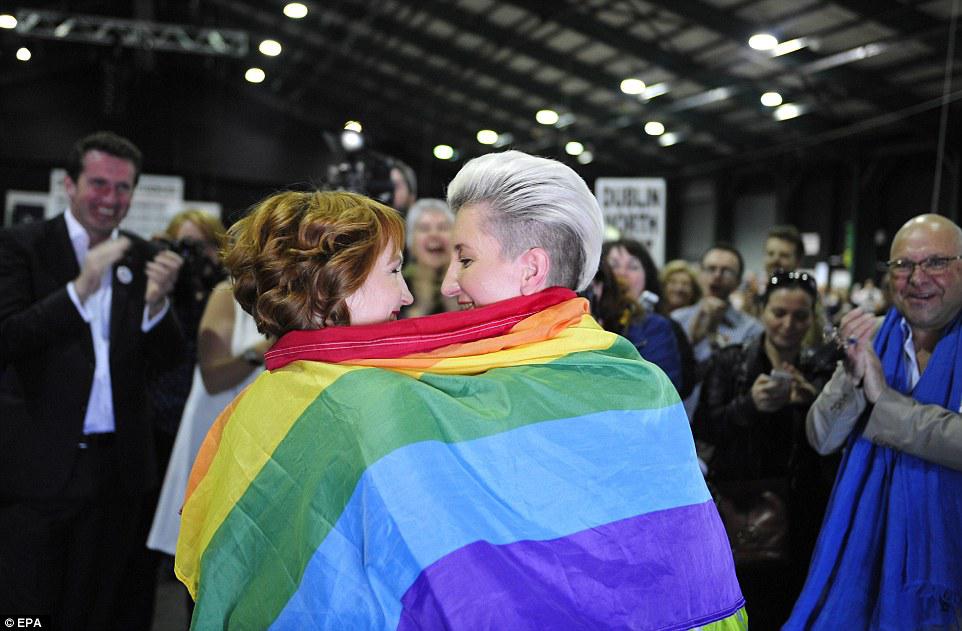 |
| Victory: Monnine Griffith (left) and Clodagh Robinson (right) celebrate at the Dublin City count centre ahead of the landslide victory for Ireland |
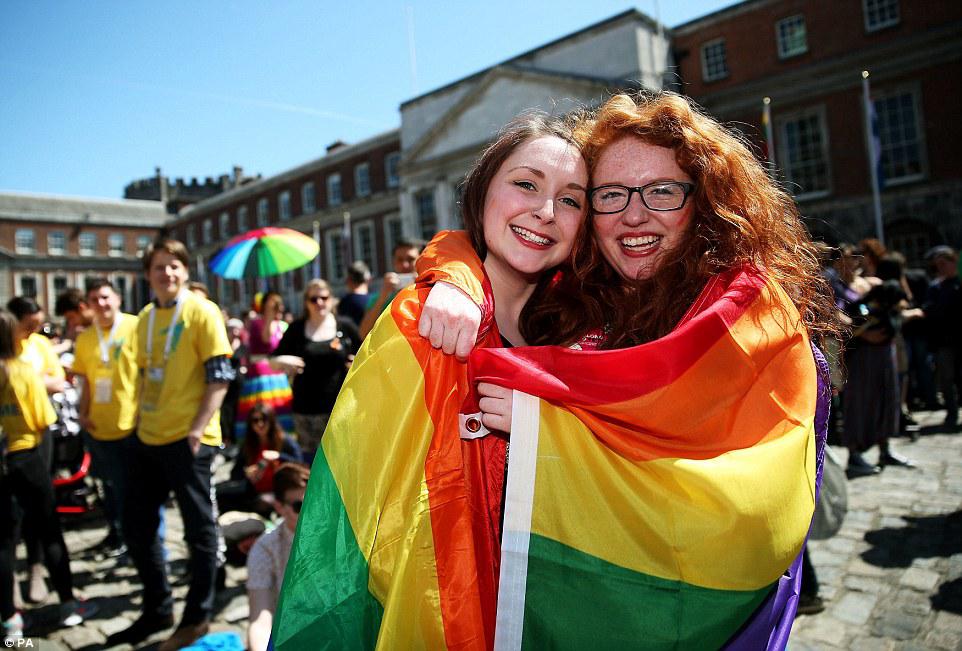 |
| Erin Reedy (left) and Dee Campbell (right) were among those celebrating in the sunshine at Dublin Castle as the result became clearer |
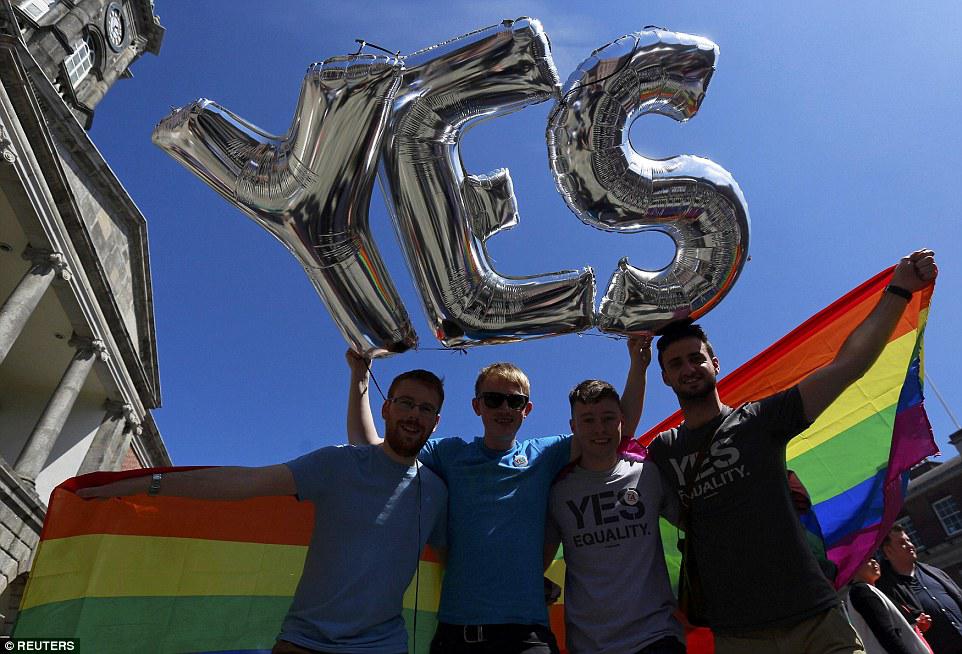 |
| In Dublin (pictured), the result was expected to be a landslide in favour of gay marriage while in many other parts of the country the constitutional amendment was expected to be passed by about two to one |
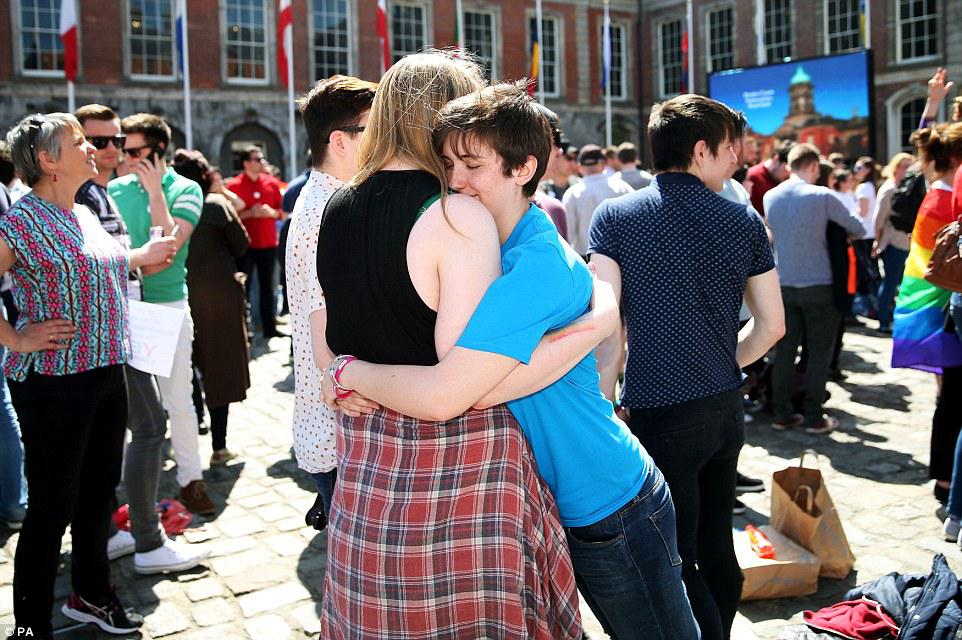 |
| Gay rights activists were seen hugging and celebrating as results filtered through to those waiting outside the main count in the capital |
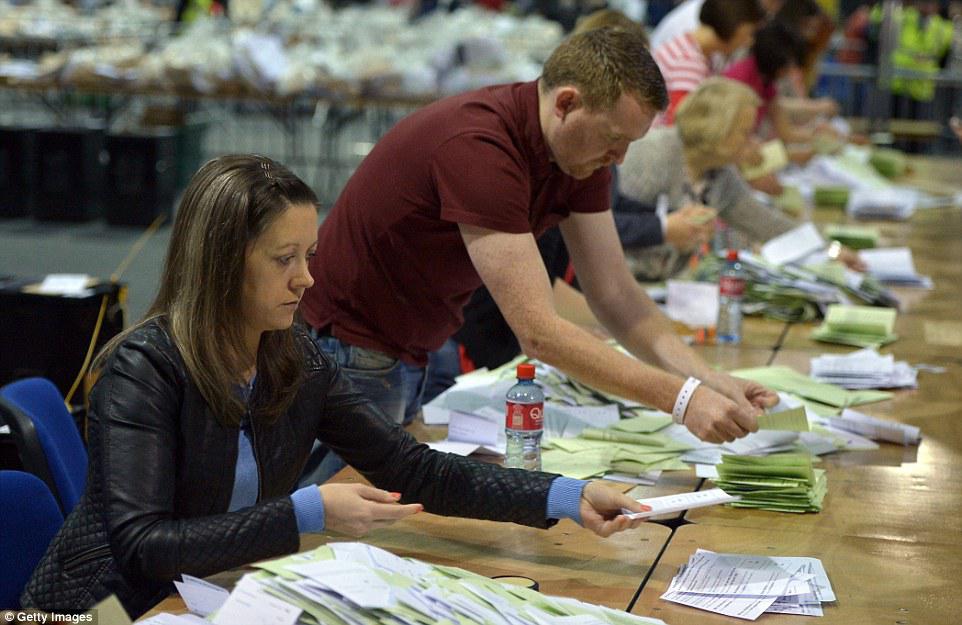 |
| Legalising gay marriage is a seismic change in Ireland, where the Church remains a powerful force. Homosexuality was illegal until 1993 and divorce until 1996, and abortion is banned except where the mother's life is in danger |
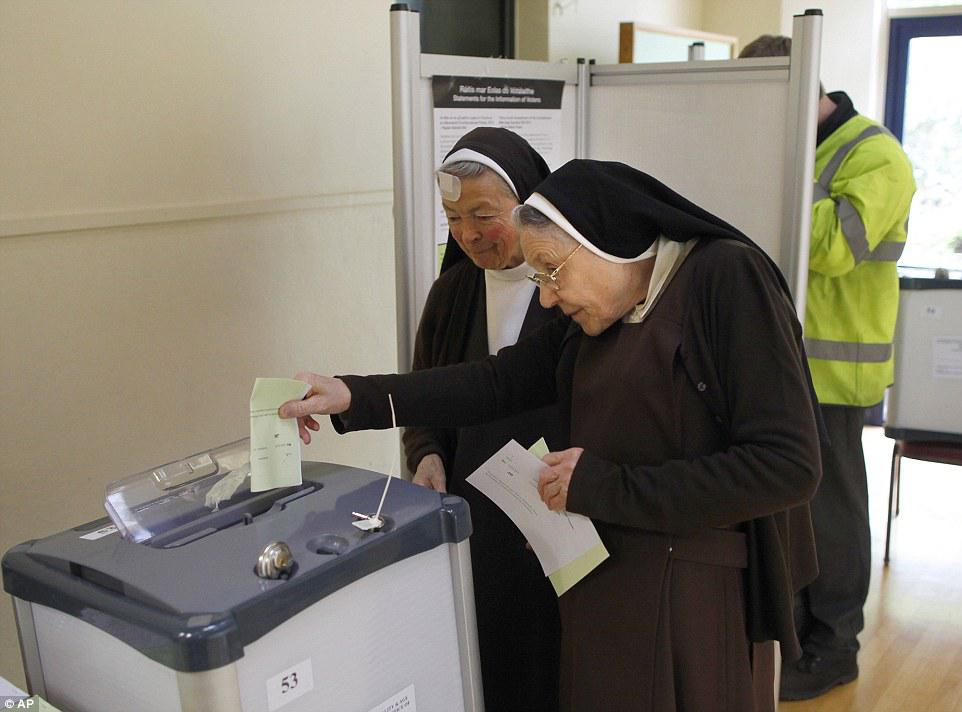 |
| Two Carmelite Nuns cast their votes in Ireland's gay marriage referendum yesterday morning, with thouasnds voting across the nation |
[with video]
'Ireland hasn't just said Yes... it has said F*** YEAH!': Irish equality minister joins thousands celebrating across the country as first gay marriage vote results point to landslide victory for supporters
Ireland has become the first country in the world to approve gay marriage by popular vote after more than 1.2million people overwhelmingly backed allowing same-sex unions in a historic referendum.
Ballots from all 43 constituencies have now been counted and official figures show 62.1 per cent supported the reform, with the highest turnout at a referendum in Ireland in over two decades.
Celebrations spilled out into the streets as thousands of 'Yes' supporters gathered in the usually quiet grounds of Dublin Castle, cheering and waving rainbow flags, feather boas and umbrellas, and bursting into a rendition of the national anthem as the landslide results were revealed.
Ireland's equalities minister Aodhán Ó Ríordáin lost his composure earlier today when it became clear the way the vote would go, tweeting: 'Ireland hasn't just said "Yes"... Ireland has said: "F*** YEAAHHHH"'.
All but one region backed same-sex unions - Roscommon South Leitrim opposed the change by a narrow margin of 51.42 per cent - with over a million voting for and 734,300 against across Ireland.
The biggest support was recorded in Dublin South where almost 75 per cent voted 'Yes', but there were closer results in some parts of the nation.
Out of a total electorate of 3,221,681, some 1,949,725 people cast their ballots in Friday's referendum, meaning a turnout of 60.52 percent, although there were 13,818 invalid ballot papers. A total of 734,300 votes were cast against the proposal, or 37.93 percent.
A large proportion of the turnout is thought to be due to students' unions encouraging members to get their names on the electoral register and a spontaneous influx of voting emigrants who marked their return on social media with #hometovote.
Voters had been asked one simple, specific question on whether to amend Article 41 of the 1937 Constitution by adding a new clause to a section titled The Family.
It asked them to support or reject a change to the 78-year-old document which reads: 'Marriage may be contracted in accordance with law by two persons without distinction as to their sex.'
Gay rights activists cried with joy as they celebrated behind the iron gates of the castle, while those that couldn't get in joined crowds spilling out from nearby bars to share the moment.
Government ministers waved a rainbow flag from the stage in front of the crowd and one lesbian senator proposed to her partner live on national television.
'The answer is yes to their future, yes to their love, yes to equal marriage. That "Yes" is heard loudly across the world as a sound of pioneering leadership from our people,' Prime Minister Enda Kenny told a news conference. 'Ireland, thank you.'
New laws on gay marriage will be put to the Dail parliament before the summer potentially paving the way for the first ceremonies to take place before the end of the year.
The result is all the more significant for the social shift it heralds in a country which was traditionally a bastion of Catholicism and conservative lifestyles.
Diarmuid Martin, Archbishop of Dublin, declared the groundswell of support for same-sex couples was a social revolution that did not happen in the last day. 'I think really the Church needs to do a reality check,' the cleric said.
In Dublin the result was expected to be a landslide in favour of gay marriage while in many other parts of the country the constitutional amendment was expected to be passed by about two to one.
Equalities minister Mr Ó Ríordáin, following his emotional tweet, said: 'This has really touched a nerve in Ireland. It's a very strong message to every LGBT (lesbian, gay, bisexual, and transgender) young person in Ireland and every LGBT young person in the world.'
Speaking on Sky News, Sinn Fein leader Gerry Adams said this was 'a huge day for equality'.
He said: 'I also think that given that the government parties were pressing quite rightly for equality in this issue then we need equality in other issues - we need equality in social issues, economic issues we need everything to be equality. So this is a hugely important day for the LGBT community and everybody else.'
Ireland's deputy prime minister, Labour Party leader Joan Burton, said Ireland was becoming 'a rainbow nation with a huge amount of diversity'.
Leo Varadkar, Ireland's health minister and first openly gay cabinet member, said it was a special day.
'It seems to me that the Irish people had their minds made up on this some time ago.
'Something has been awakened in the Irish people... it was not just a referendum it was more like a social revolution,' he said.
'We're the first country in the world to enshrine marriage equality in our constitution and do so by popular mandate. That makes us a beacon, a light to the rest of the world, of liberty and equality. So it's a very proud day to be Irish.'
Senator David Norris, who fought from the 1970s to 1993 to have homosexuality decriminalised, said it was a wonderful result.
'We've been brought on board as equal citizens by the generosity of and decency of our straight and fellow citizens and for that I am deeply grateful,' he said.
Church of Ireland bishops said: 'We would now sincerely urge a spirit of public generosity, both from those for whom the result of the referendum represents triumph, and from those for whom it signifies disaster.'
Grainne Healy, co-director of the Yes Equality group, said: 'Today's result means that having been "branded and isolated" for decades, each lesbian and gay person knows now that they too belong in Ireland, as full, equal citizens.'
Pat Carey, a former government minister who came out as gay earlier this year aged 68, welled up saying: 'It's down to the brave, ordinary people of Ireland who took their courage in their hands.'
Young people are said to have turned out in unprecedented numbers to cast their vote, with an official result due this afternoon.
Taoiseach Enda Kenny said there was a movement of young people who were firmly behind the reforms.
'I think from a young person's perspective, particularly for those who travelled from wherever to wherever to put a simple mark on a paper, shows the value of the issue and the importance of politics,' he said.
John Murray, director of the Iona Institute religious think-tank - one of the leading groups fighting the reform - admitted defeat this morning.
'Obviously I'd be disappointed in that. We did our best to fight a good campaign and if having run that we haven't won it, we did our best,' he said.
'Everyone is saying it is Yes and I'm not going to argue with that.'
Other countries have held referendums on gay marriage, including Croatia, Slovakia and Slovenia, where same-sex unions were voted against by the electorate. Ireland now joins nineteen other countries where gay marriage is legal.
Ireland decriminalised homosexuality just 22 years ago in 1993, while the UK made gay sex legal in 1967.
The first gay marriages in Britain took place last year but they are still outlawed in Northern Ireland.
In a separate referendum also being held today, voters are being asked their views on proposals to reduce the age limit on who can stand for the presidency from 35 to 21.
|





